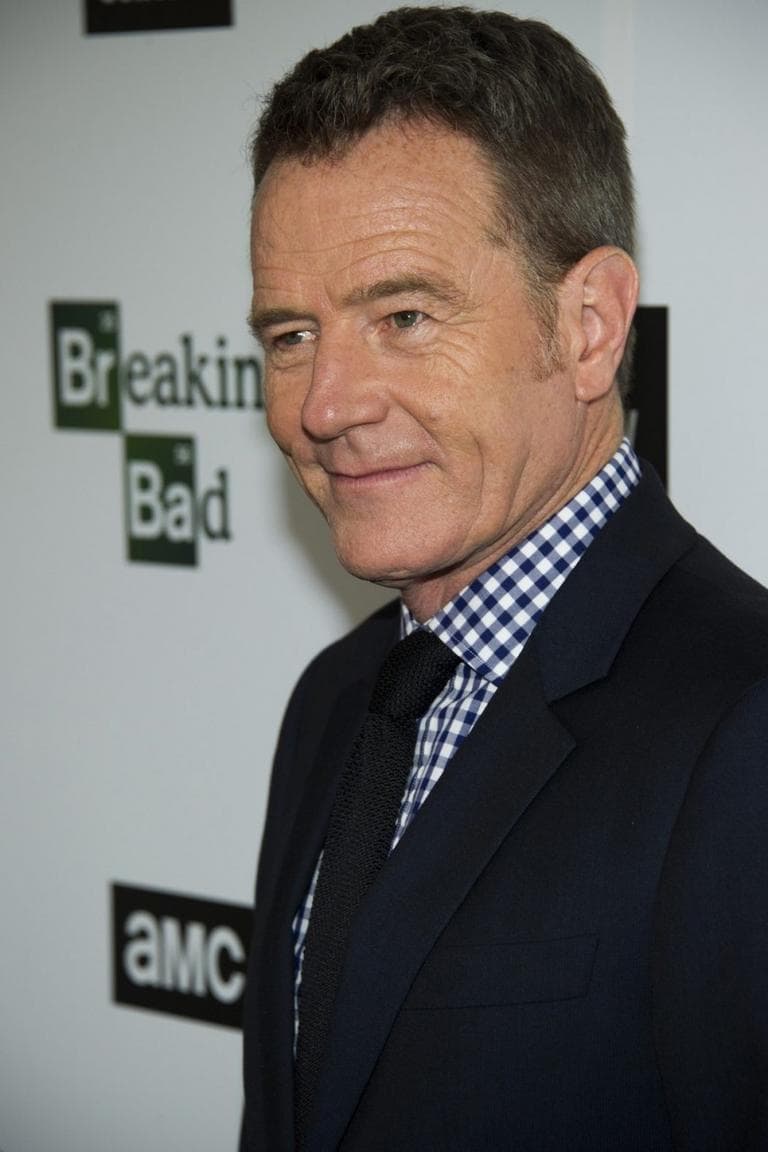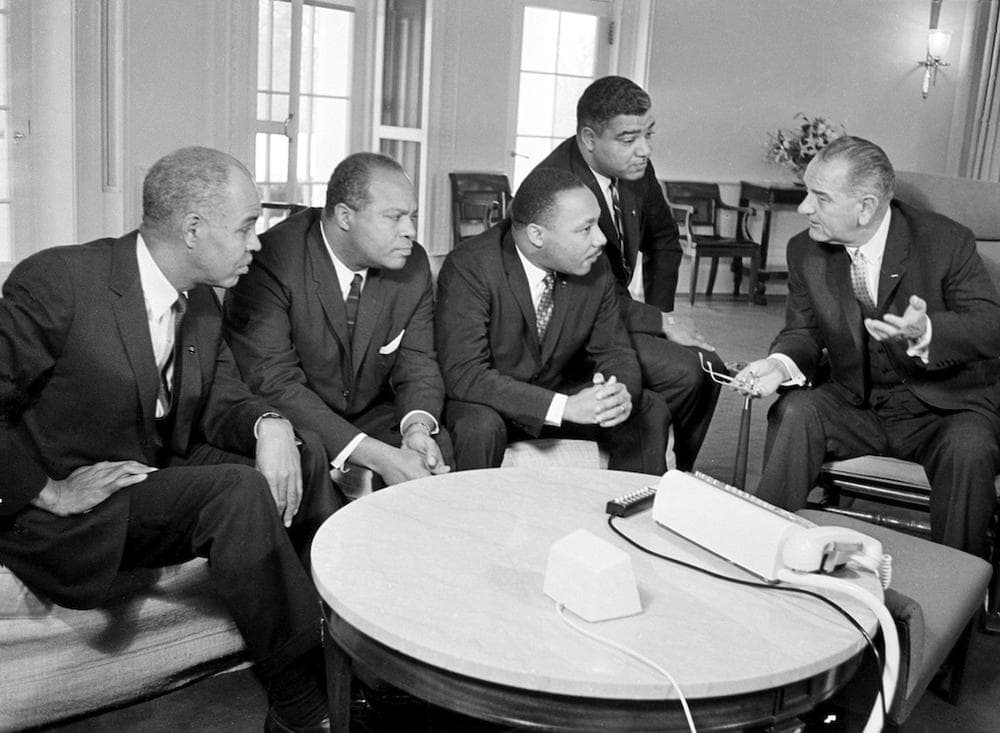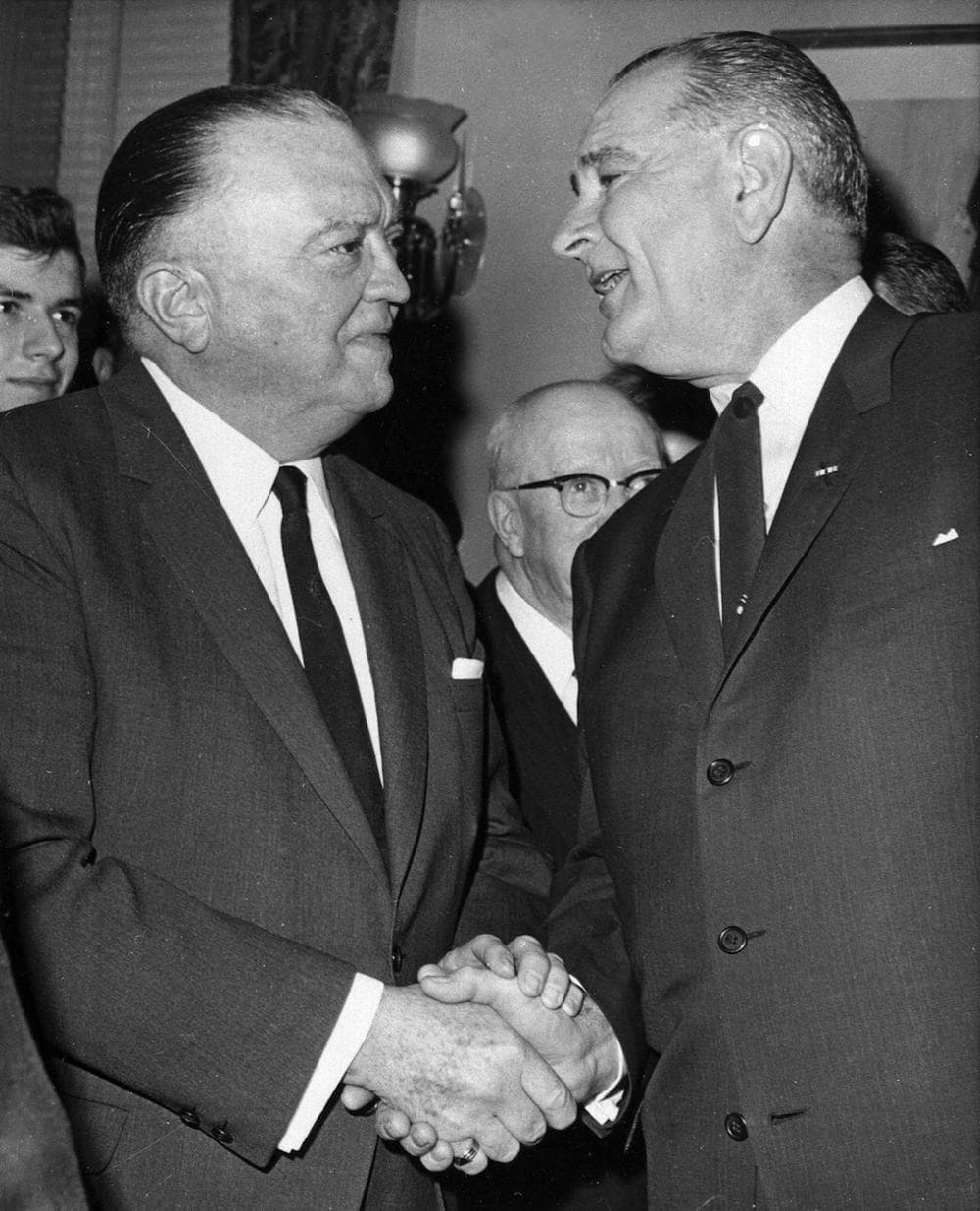Advertisement
'All The Way' With LBJ — Did He Break Bad, Too?
Updated 9/11: The American Repertory Theater announced today that the run of "All The Way," directed by Bill Rauch, is sold out. A limited number of standing room tickets will be sold on the day of each show — in person only and only one ticket per person — at the A.R.T. Ticket Services Office. There will be no standing room for previews, Opening Night, or the final performance. The production begins previews on Sept. 13, opens Sept. 19 and runs through Saturday, Oct. 12.
___
Do you find yourself, given the partisanship in Washington, wishing for the golden days of the 1950s or ‘60s when Democrats and Republicans were able to hash out their differences with civility and respect?
Careful what you wish for. As Pulitzer Prize-winning playwright Robert Schenkkan makes clear in “All The Way,” those golden days were incredibly tarnished, even when you look at the great accomplishments of the era. We’re talking about Lyndon Baines Johnson, the 36th president of the United States, and the subject of the play that begins previews at the American Repertory Theater Sept. 13 and opens Sept. 18. It runs through Oct. 12, but it’s an increasingly difficult ticket.

We’re also talking about the man who will be taking the stage as LBJ, Bryan Cranston, who has recently wrapped up that other little gig he had – “Breaking Bad.” Cranston has deservedly won three Emmys for playing Walter White, the family man who had (has?) a talent for cooking methamphetamine and, as it turned out, for killing any number of folks whom he perceived as a threat.
Don’t worry, I don’t know how "Breaking Bad" ends and neither does Schenkkan, who would rather see it play out along with the rest of us. But we do know how it ended for Cranston’s more recent incarnation, LBJ. Not well.
“All the Way” is concerned with the beginning, from the aftermath of the Kennedy assassination that propelled Johnson into the White House to his 1964 electoral landslide victory over Barry Goldwater. But of much more concern to the play is Johnson’s passage of the landmark Civil Rights Act. Not that “All the Way” spends a ton of time on Johnson’s heroics. His brutality didn’t approach Walter White’s, but his Machiavellianism and ruthlessness are front and center in “All The Way,” whether dealing with Martin Luther King Jr (Brandon J. Dirden), Hubert Humphrey (Reed Birney) or J. Edgar Hoover (Michael McKean).
Here, in an edited interview, is what Shenkkan had to say about LBJ and the man who plays him.

Ed Siegel: Why Cambridge rather than a larger city like New York?
I wanted another chance to work on the play, to refine some scriptural elements and some production elements. They do such good work at A.R.T. ... and they have exceeded all my expectations. And [director] Bill Rauch is very comfortable at A.R.T. , given his background. [He’s a Harvard graduate.] Boston is a great theater town, it really understands theater. Boston is also a great political town. It’s the second favorite sport, I hear, maybe the first.
And how did Bryan Cranston get involved?
We needed a certain stature, a certain profile, and I’ve been a huge fan of his, really since “Malcolm in the Middle.” The range from Mr. White to that hapless father is really amazing. He brings a certain intelligence, a certain ferocity, a chameleon acting ability, a good sense of humor, all qualities LBJ possessed. Again, as with A.R.T., he has passed all my expectations. I think he’s going to be breathtaking.
Are you a “Breaking Bad” fan?
A huge fan. I think it’s brilliantly written, beautifully cast and it is really kind of immaculate. “The Wire” is maybe my favorite television and this comes a close second. The writing, the characters, it’s like a Russian novel or a Greek tragedy. I haven’t seen the last two episodes, so don’t tell me anything.
I guess he hasn’t told you how it ends.
He’s such a pleasure to work with, very dedicated. He brings a great intensity and focus to his profession. He’s certainly willing to talk about the show, but doesn’t interject anything and wouldn’t let any secrets out. And I don’t want to know, I want to have the pure viewer experience.
Jack Willis won raves as LBJ in the world premiere [at the Oregon Shakespeare Festival in Ashland] and is an A.R.T. veteran. Was any thought given to him doing it here?
Jack’s a phenomenal actor and is going to play LBJ in the world premiere of “The Great Society” in Ashland. He made a commitment to Ashland where he’s playing Lear right now, so it didn’t work out for a number of reasons, but none of those reasons were a lack of respect for him or a reflection of his portrayal of LBJ.
(Here's a taste of Willis in the role:)
OK, LBJ. Martin Luther King is obviously torn between conscience and political necessity, as you say in a stage direction. But at the end of the day, most people would say he’s a man of conscience. What about LBJ?
That’s a really interesting question. Ultimately it depends how you look at 1968 and how you interpret his decision not to seek reelection. I personally believe that it was an act of conscience. It came from a place of self-awareness that he was the primary architect of the war and it was in the best interests of the country if he didn’t run, that there would be a better chance for a negotiated settlement. Tragically that didn’t happen for a variety of reasons.
LBJ is such a complicated man, but the play focuses on that one year, 12 amazing months in a political career. You see him working on behalf of civil rights, but violating ethical and moral standards in order to meet his goals, chief of which is to get reelected. But I think that ultimately the passage of the Civil Rights Act was an act of conscience. He bet the ranch on it and it absolutely cost him politically, with friends, his political base and he knew it would hurt the Democratic Party. As it did.
But it’s complicated. We as the audience root for him when he’s working for civil rights and take great pleasure in his lying, bullying, all of that, the audience cheers him. When he uses the same tactics in his own reelection, it’s not so clear. What this play is about ultimately is the morality of politics, power, where do you draw the line in terms of intentions and action. How much leeway does a good intention give you to violate the law? The question is not without import today.

You mentioned Martin Luther King. I wanted to emphasize a side of him that doesn’t get nearly enough recognition. The man was an extraordinary politician in his own right — to keep in line all the factions of what we call the American civil rights movement, to keep them together while working simultaneously on very hard-edged negotiations with the white political structure, I don’t think that gets nearly enough attention. There was a lot of compromise, a lot of sacrifice, but along with the oratory, he was a shrewd politician with a great instinct for the moment and a great dealmaker. He kept what we think of as the civil rights coalition together.
And no one was able to keep it together after his death.
No one could.

How tempted are you to write a sequel based on ’68?
I am actually revising the sequel, “The Great Society.” The world premiere will be at the Oregon Shakespeare Festival next summer, directed by Bill Rauch, taking us from 1964 to 1968.
There’s a temptation to say that LBJ was something of a tragic figure who could have been one of the great presidents in history except for Vietnam. Does that square with your thinking?
I do think he’s a tragic figure, I do, and I agree with assessment that if you could just separate out his domestic achievements he would have been thought of much differently. But he bears a tremendous responsibility for Vietnam, you can’t diminish that in any way. JFK and Dwight Eisenhower bear responsibility, too, but LBJ’s lying and escalation of the war are part of his legacy. He had said that he left the woman he loved, domestic politics, for that bitch of a war. But I’m pleased to see new thinking emerge about LBJ and the ‘60s … The programs that emerged had a tremendous effect. Medicare, Medicaid, civil rights. They changed the country in a better way, they changed the way we think.
So yes, he was a tragic figure because he knew. He was a shrewd man, a smart man, he knew what the consequences of Vietnam were going to be.
More on "All The Way" and "Breaking Bad"
Radio Boston interviews Bryan Cranston
Jimmy Fallon spoofs "Breaking Bad"
Robert Schenkkan on playwrights and history
This program aired on September 9, 2013. The audio for this program is not available.

